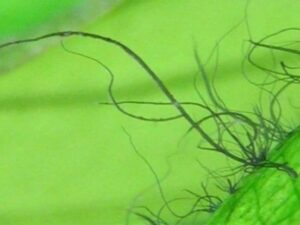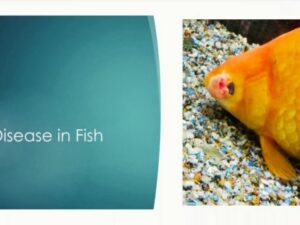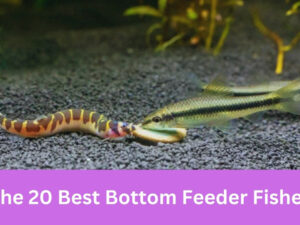Let’s discuss the Guppy Fish Care Guide. Guppies are one of the most popular fish kept as pets. They are hardy, relatively easy to care for, and come in various colors and patterns. These freshwater fish originate from tropical climates and do best in warm water. They are low maintenance and are ideal for beginners.
So many things will make you fall in love with this species. If you’re thinking about adding a Guppy or two to your aquarium, read on for everything you need to know about Guppy care. These highly adaptable and low-cost fish make them popular in the aquarium trade.
Although they are hardy and low maintenance, you must remember certain things to keep these fish happy and healthy. This article will cover everything from the Guppy diet and tank requirements to breeding and common health problems.
By the end of this article, you will be an expert on Guppy care and be ready to add these beautiful fish to your home aquarium. So to know more, please continue reading.
Table of Contents
- Species Specifications
- Guppy Fish Care Guide
- Guppy Fish Diet in the wild
- Guppy Fish Feeding Frequency
- Guppy Fish Tank Size and Dimensions
- Water Changes
- Cleaning the Tank
- Gravel
- Water Conditioners
- Lighting and Heating Requirements
- Filtration Requirements
- Ammonia and Nitrates Level
- Protein Skimmer and Gravel Vacuum
- Water Test Kits
- Guppy Fish Compatibility and Tank Mates
- Sexing the Guppies
- Guppy Fish Potential Diseases
- Guppy Fish Treatments and Medications
- Advantages Of Having Guppy Fish In Your Tank
- Disadvantages Of Having Guppy Fish In Your Tank
- Wrapping It Up
Species Specifications
| Scientific name: | Poecilia reticulata |
| Common names: | Guppy, million fish, rainbow fish |
| Distribution: | Antigua, Trinidad, Barbados, Guyana, Venezuela, Tobago |
| Genus: | Poecilia |
| Family: | Poeciliidae |
| Size: | 0.6–2.4 inches |
| Life expectancy: | 1-3 years |
| Color: | Yellow, orange, blue, black, red, green, pink |
| Diet: | Omnivore |
| Temperament: | Peaceful |
| Minimum tank size: | 5 gallons |
| Temperature: | 74°–82°F (23°–28°C) |
| pH: | 6.8–7.6 |
| Hardness: | 8– 12 dGH |
| Care Level: | Easy |
| Breeding: | Livebearing |
| Cost: | Between $4 to $25 |
Guppy fish is the most common and fantastic freshwater fish in the pet trade. They are trendy for their stunning coloration and fast breeding rate. These are the perfect example of domesticated freshwater fish.
Even though goldfish are the most popular fish worldwide, guppies are gaining popularity and are relatively liked more than goldfish as they are easier to keep healthy. You now know how popular Guppy fish is, but before purchasing, you should know which fish is healthy and which is not.
You need to get healthy fish to avoid any hassle. A healthy Guppy fish would have its stomach bulging, fins flowing gracefully in the water, and its tail should be held high. The eyes should be clear and not sunken in, and there should be no visible damage to the fish.
You should always get your fish from a reputed supplier or pet store to ensure you get the best fish and no trouble.
Check Otocinclus Catfish Care Guide: Appearance, Lifespan, Food & Diet, Breeding & All
Guppy Fish Appearance and Physical Characteristics
Guppies are one of the most colorful freshwater fish available on the market. They come in various colors and patterns, making them popular among fish keepers. They have gorgeous tailfins filled with color. These fish have a minnow-like profile with a pointed snout and upturned mouth.
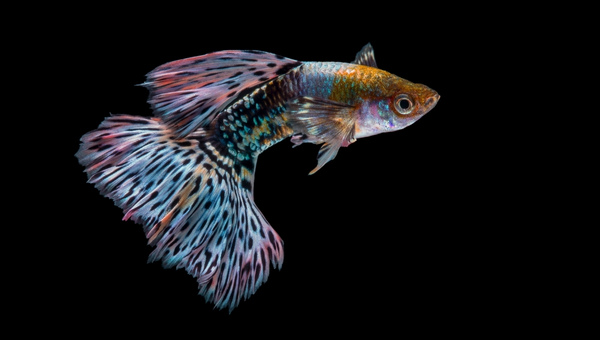
Spots and stripes can be found as patterns on the body fins and tail of the Guppy fish. After the caudal fork, there is a blast of beauty. They have a sizeable fan-shaped fin compared to the rest of the body.
You can see similar colors and flowy texture in the other fins, but the tailfin is where most of the details are.
Guppy Fish Color Morphs and Availability
As we said earlier, guppies come in various colors and patterns. They are one of the most popular freshwater fish regarding color morphs. There are more than 300 different varieties. Over time, selective breeding has resulted in fish keepers’ various colors and patterns.
Some popular color morphs include albino, blue, black, bronze, gold, green, orange, purple, red, silver, white, and yellow. You can also find color morphs combining two or more colors, such as bi-color and tri-color guppies.
Guppies with lace, tiger, leopard, mosaic, piebald, snakeskin and many other patterns can be found. Guppy fish is widely available on the market, and you can find them in almost any pet store that sells freshwater fish.
You can also find them online from various websites that sell tropical fish. The price of a Guppy fish varies depending on the color morph and pattern. Some of the rarer color morphs can be pretty expensive.
Guppy Fish Adult Size and Life Expectancy
Guppy fish is a small freshwater fish that grows only about 2.4 inches long. In the wild, they have a very short lifespan of only 2-3 years. In an ideal tank environment, they can live longer than wild guppies because guppies in the wild are exposed to more dangers and predators.
Guppy Fish Origin and Distribution Around the World
Guppy fish is a freshwater fish that is native to South America. They are found in Trinidad, Tobago, Guyana, Venezuela, and Suriname. Guppy fish were introduced to other parts of the world for mosquito control, such as Europe, Asia, and North America.
Guppy Fish Behavior and Temperament
Guppy fish are peaceful fish. They are active, and they enjoy swimming around the tank. Guppy fish are social creatures, and they do well in groups. It is best to keep at least 6 Guppy fish together. The minor fish may show some signs of aggression.
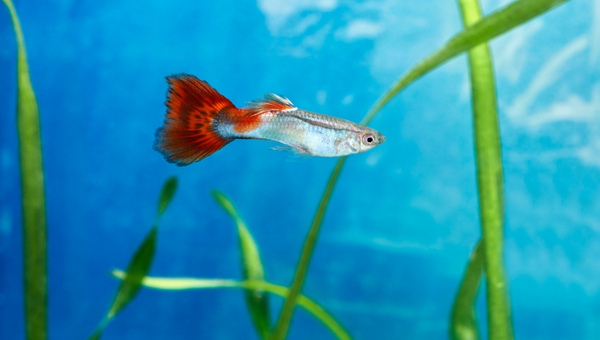
They might nip the fins of other fish. They are fast swimmers and tend to gravitate towards the fins of slow-moving fish.
Guppy Fish Breeding
Guppy fish are livebearers, meaning they give birth to live young. Guppy fish can breed all year long. The gestation period for Guppy fish can last between 21 and 40 days. The female Guppy will give birth to more than 200 babies.
You will need to set up a breeding tank to breed Guppy fish. The breeding tank should be at least 10 gallons. The water in the breeding tank should be clean and well-filtered. The temperature of the water should be between 74° to 82°Fahrenheit. The pH level of the water should be between 6.8 to 7.6.
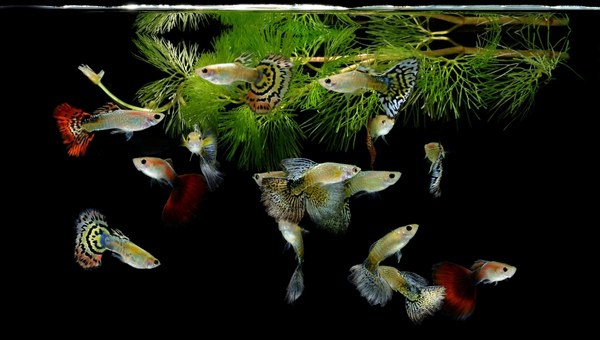
You must put a male and female Guppy in the breeding tank. The male Guppy will chase the female Guppy around the tank. After a few days, the female Guppy will give birth to live young. The fry (baby guppies) will hide among the plants in the tank.
The fry is tiny, and they cannot swim well. The fry must be fed live food such as brine shrimp or micro worms. After a few weeks, the fry will grow large enough to be moved to a new tank. It is best to keep the fry in a tank until they are large enough to be around other fish.
Also, check Bichir Ultimate Care Guide: Tankmates, Breeding, Diet, Types & All
Guppy Fish Care Guide
Here, we will share a complete care guide for Guppy fish.
Guppy Fish Diet in the wild
Guppy fish are omnivores in the wild, and their diet consists of plant and animal matter. They feed on crustaceans, insects, and worms. They also like to eat algae and other plants. To find food in the wild, Guppy fish spend most of their time near the water’s surface, where there is more food.
You may also check Bellus Angelfish Care: Appearance, Size, Lifespan, Diet & All.
Guppy Fish Feeding Frequency
Guppies should be fed two or three times a day. They should be given as much food as possible in one to two minutes. It is important not to overfeed them because this can lead to water pollution and health problems for the fish.
They are bright and might as well learn the routine and show excitement when you approach the tank.
Guppy Fish Tank Size and Dimensions
Guppy fish are small, so they do not need a large tank. A 5-gallon tank is sufficient for a small Guppy fish. If You need a larger tank and plan to keep a larger group of guppies, tank size will also depend on the other fish being held with the guppies.
Guppy fish are not strong swimmers, so they do not need much swimming space. A tank 2 feet long, 1 foot wide, and 1 foot tall is a good size for a small group of guppies. You will need a larger tank to keep a larger group of guppies.
Water Changes
Guppy fish produce a lot of waste and are sensitive to water pollution. It is essential to do regular water changes to keep the water clean and the fish healthy. Water changes should be done every one to two weeks. The amount of water that should be changed will depend on the size of the tank and the number of fish in the tank.
Cleaning the Tank
In addition to doing water changes, cleaning the tank regularly is essential. The tank should be cleaned every two weeks. Remove all the decorations and gravel from the tank to clean the tank. Then, rinse the decorations and gravel in clean water.
Next, scrub the inside of the tank with a sponge or a soft brush. Finally, rinse the inside of the tank with clean water.
Check Panther Grouper Care Guide: Appearance, Lifespan & Coloration & Breeding
Gravel
Guppy fish do not need gravel in their tank. If you add stone to the tank, use small pieces of rock. Large pieces of gravel can be a choking hazard for Guppy fish. The best gravel to use is aquarium-grade gravel.
Water Conditioners
Guppy fish are sensitive to water pollution. It is essential to use a water conditioner when setting up their tank. Water conditioners help to remove chlorine and other chemicals from the water. They also help to neutralize ammonia and nitrites. Be sure to use a water conditioner that is designed for freshwater aquariums.
Lighting and Heating Requirements
Guppy fish do not need special lighting in their tank. A standard aquarium hood with an incandescent light bulb is sufficient. The light should be turned on for 12 hours a day.
Guppy fish require a heater to maintain the proper water temperature. The heater should be turned on and allowed to warm the water to the desired temperature before adding the fish to the tank. The heater should be turned off when the water reaches the desired temperature.
Filtration Requirements
Guppy fish produce a lot of waste and are sensitive to water pollution. A sound filtration system is essential for a Guppy fish tank. The filter should be able to filter all the water in the tank at least once every hour.
A few different filters can be used for a Guppy fish tank. The most common type of filter is an under gravel filter. An under gravel filter is a good choice for a Guppy fish tank because it is easy to set up and it is not expensive.
Another type of filter that can be used for a Guppy fish tank is a power filter. Power filters are more expensive than under gravel filters but are more effective at filtering the water.
The third type of filter used for a Guppy fish tank is a canister filter. Canister filters are the most expensive type but are also the most effective at filtering water.
Also, check Cherry Shrimp Care Guide: Appearance, Food & Diet, Lifespan & All.
Ammonia and Nitrates Level
Guppy fish are susceptible to water pollution. Ammonia and nitrate levels should be monitored regularly. The ideal ammonia level for a Guppy fish tank is 0 ppm. The outstanding nitrate level for a Guppy fish tank is 20 ppm. These elements in your tank can be evil and fatal for your freshwater fish.
Protein Skimmer and Gravel Vacuum
A protein skimmer is an excellent addition to a Guppy fish tank. A protein skimmer helps to remove waste and debris from the water. A gravel vacuum is also a perfect addition to a Guppy fish tank. A gravel vacuum helps to remove waste and debris from the gravel. These two devices can make the cleaning process a lot easier.
Water Test Kits
A water test kit is a good investment for any fish tank. A water test kit will help you track your Guppy fish tank’s ammonia, nitrate, and pH levels. Water test kits are available at most pet stores. There are many different brands of water test kits available. Be sure to choose equipment that is designed for freshwater aquariums.
Guppy Fish Compatibility and Tank Mates
Guppy fish are peaceful and do well with other delicate fish. Some good tank mates for Guppy fish include:
- Corydoras catfish
- Tetras
- Mollies
- Platies
- Swordtails
- Rasboras
Avoid putting Guppy fish in a tank with aggressive fish. Aggressive fish will harass and bully the Guppy fish.
Sexing the Guppies
Males and females look different. Males are usually smaller than females, and they have longer fins. Females are more significant than males, and their fins are shorter. The easiest way to tell the difference between a male and a female Guppy is by looking at their anal fin.
The anal fin of a male Guppy is long and pointy. The anal fin of a female Guppy is short and round.
Guppy Fish Potential Diseases
Guppy fish are susceptible to several diseases. Some of the more common illnesses that affect Guppy fish include:
- Ich: Ich is a parasitic infection that causes white spots on the fish’s body. Ich is highly contagious and can quickly spread from one fish to another.
- Velvet: Velvet disease is a parasitic infection that causes fish to develop a velvet-like coating on their body. Velvet disease is highly contagious and can quickly spread from one fish to another.
- Fin rot: Fin rot is a bacterial infection that causes fish fins to deteriorate. Fin rot is highly contagious and can quickly spread from one fish to another.
- Fungal infections: A fungus causes fungal infections. Fungal infections can cause the fish’s skin to turn white or yellow. Fungal infections are highly contagious and can quickly spread from one fish to another.
It is essential to keep an eye out for any signs of disease. Some common symptoms of the disease include:
- Loss of appetite
- Lethargy
- Clamped fins
- White spots on the body
If you notice any of these signs, you should take your fish to a veterinarian specializing in fish.
Guppy Fish Treatments and Medications
Several treatments and medications can be used to treat the diseases that affect Guppy fish.
- Ich can be treated with several medications, including copper sulfate, formalin, and malachite green.
- Velvet disease can be treated with several medications, including copper sulfate and formalin.
- Fin rot can be treated with many medications, including antibiotics.
- Fungal infections can be treated with several medications, including fungicides.
It is essential to follow the directions on the package when using any medications or treatments. Overdosing fish on drugs can be as harmful as not treating them. The best way to prevent disease is to keep the tank clean and well-maintained.
It would be best to quarantine new fish before adding them to the tank. Quarantining fresh fish will allow you to observe them for any signs of disease.
You may also check 12 Most Popular Types Of Danios: Appearance, Care, LIfespan & All
Advantages Of Having Guppy Fish In Your Tank
Guppies are one of the most popular aquarium fish for several reasons. Guppies are easy to care for and available in various colors. Guppies are also relatively inexpensive, making them a good choice for people just starting a hobby. Guppies are peaceful fish and make an excellent addition to any community tank.
Disadvantages Of Having Guppy Fish In Your Tank
Guppies are live-bearing fish, meaning they give birth to live young. This can be advantageous for people who want to breed fish, but it can also be a disadvantage if you do not wish to fry (baby fish) in your tank. Guppies are also relatively active fish and need much space to swim. This means you will need a larger tank to keep the guppies.
Wrapping It Up
Guppies are a popular choice for people just starting a hobby. They are easy to care for and available in various colors. Guppies are also relatively inexpensive and peaceful, which is excellent for beginners. They are easy to care for and thrive even in a small tank.
They are intelligent and fun to watch. They have advantages and disadvantages, but that doesn’t mean they are unsuitable for your freshwater tank. It would be best to consider adding them to your tank to bring more color and joy.
We hope that this article has been helpful and informative. Guppies can be a great addition to any freshwater tank. Be sure to do your research before adding any fish to your tank. Not all freshwater fish are the same od your research to see if your chosen fish is compatible with the guppies or not.
Before getting them, you must be sure you can care for them, provide for them, and fulfill all their needs. We hope you are excited and looking forward to getting guppies as your new pet. Thank you so much for reading.

